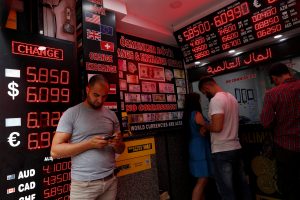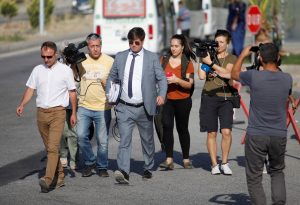
By Babak Dehghanpisheh
(Reuters) – Turkish President Tayyip Erdogan called for a ceasefire in the rebel-held region of Idlib in northwest Syria on Friday and said an anticipated government assault on insurgents there could result in a massacre.
But Russia’s President Vladimir Putin said Moscow opposed a truce, and Iranian leader Hassan Rouhani said Syria must regain control over all its territory.
The three presidents, whose countries’ are key foreign players in Syria’s long civil war, were speaking at a summit in Tehran aimed at charting a way to end the conflict.
The situation in Idlib, the insurgents’ only remaining major stronghold, is an immediate issue as President Bashar al-Assad’s forces, backed by Russia and Iran, prepare for what could be the conflict’s last decisive battle.
The United Nations has warned a full-scale assault could lead to a humanitarian catastrophe.
But as the leaders gathered in Tehran, Russian and Syrian government warplanes hit rebel-held parts of Idlib, the Syrian Observatory for Human Rights war monitor said.
Tehran and Moscow have helped Assad turn the course of the war against an array of opponents ranging from Western-backed rebels to Islamist militants, while Turkey is a leading opposition supporter and has troops in the country.
Their discussions in Tehran mark a crucial point in a seven-year-old war which has killed more than half a million people and forced 11 million to flee their homes.
Erdogan called on Putin and Rouhani to agree to a ceasefire in Idlib, saying such an accord would be a “victory” of their summit. Turkey could no longer take in any more refugees from any new assault in Idlib, he said.
However, Putin responded that he opposed a ceasefire because Nusra Front and Islamic State militants located there were not part of peace talks. Syria should regain control of all its territory, he said.
“The fact is that there are no representatives of the armed opposition here around this table. And more still, there are no representatives of Jabhat al-Nusra or ISIS or the Syrian army,” Putin said.
“I think in general the Turkish president is right. It would be good. But I can’t speak for them, and even more so can’t talk for terrorists from Jabhat al-Nusra or ISIS that they will stop shooting or stop using drones with bombs.”
FINAL MAJOR BATTLE
Rouhani also said the battle in Syria would continue until militants were pushed out of the whole country, especially in Idlib, but he added that any military operations should avoid hurting civilians.
He called on all militants in Syria to disarm and seek a peaceful end to the conflict.
“The fight against terrorism in Idlib is an indispensable part of the mission to return peace and stability to Syria, but this fight should not harm civilians and lead to a “scorched-earth” policy,” Rouhani said.
Erdogan also said Turkey no longer had the capacity to take in any more refugees from Syria should the government offensive in Idlib go ahead. Turkey has accepted 3.5 million refugees from Syria since the start of the war in 2011.
“Whatever reason there is an attack that has been made or will be made will result in disaster, massacre and humanitarian drama,” he said. “Millions will be coming to Turkey’s borders because they have nowhere to go. Turkey has filled its capacity to host refugees.”
The Assad government was not directly represented at the summit, nor was the United States or other Western powers.
Widely abhorred internationality for the brutal conduct of the war, Assad has largely reclaimed most of Syrian territory though much of it is ravaged.
As the conflict approaches its endgame, Iran, Turkey and Russia are seeking to safeguard their own interests after investing heavily militarily and diplomatically in Syria.
Meanwhile, the fate of Idlib hung in the balance.
“The battle for Idlib is going to be the final major battle,” said Hilal Khashan, a political science professor at the American University of Beirut, told Reuters before the summit.
“It will be waged irrespective of civilian casualties, even though they will make an effort to minimize it.”
(Reporting By Babak Dehghanpisheh; additional reporting by Laila Bassam in Beirut and Dominic Evans in Istanbul, Editing by Angus MacSwan)










